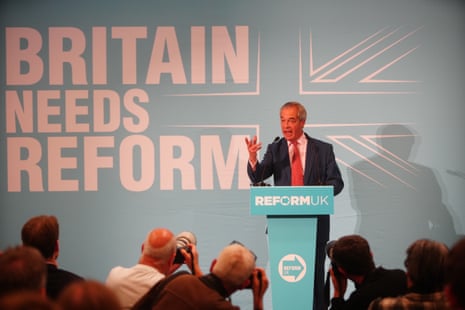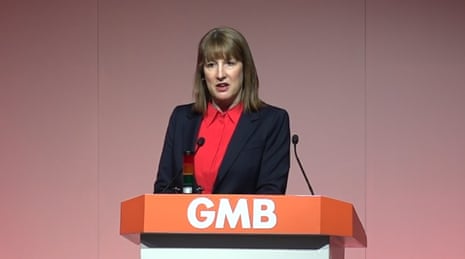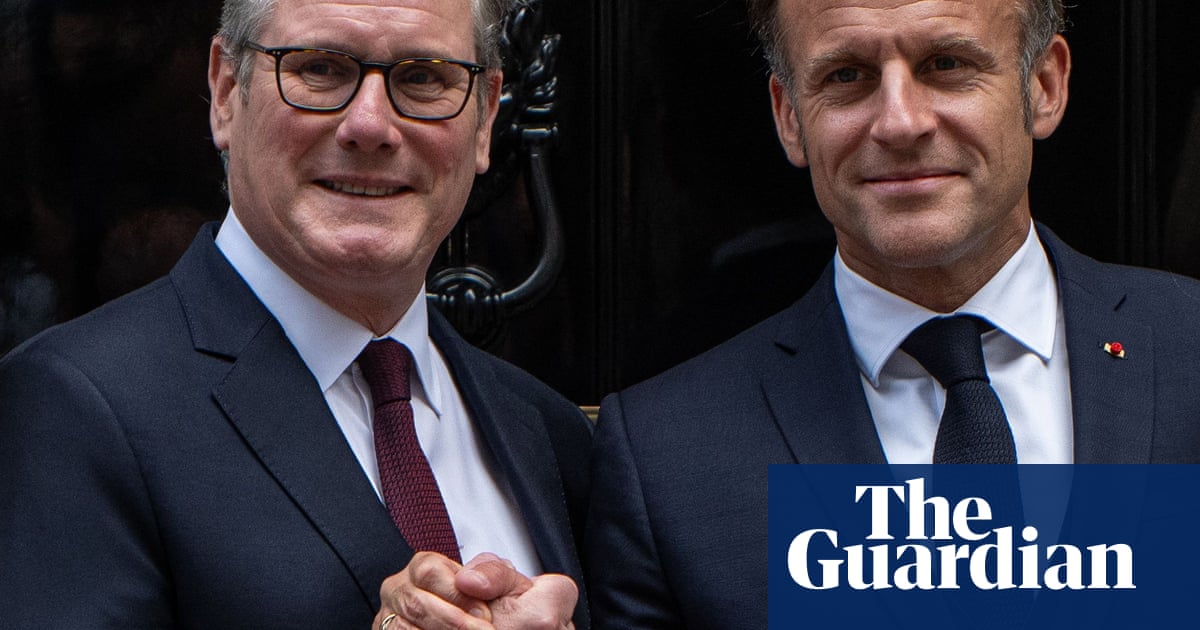Lib Dems denounce new Reform UK chair as 'Trump sycophant'
The Liberal Democrats have criticised Nigel Farage for appointing someone they describe as a Trump sycophant as Reform UK chair.
In a statement about the appointment of David Bull (see 11.55am), Daisy Cooper, the Lib Dem deputy leader, said:
The conveyor belt of Trump sycophants appointed by Nigel Farage rolls on.
Reform is more interested in advancing Donald Trump’s agenda over here, not standing up for the communities that they are supposed to represent.
This elevation of yet another Trump lapdog is just further evidence of this.
To justify their comment, the Lib Dems highlighted this tweet from Bull celebrating Trump’s election victory last year, and another showing that, as a Talk TV presenter, Bull once went on air with a bandage over his ear show he could show “solidarity” with Trump after the assassination attempt.
With Labour reluctant to criticise President Trump because they have to negotiate with him, and the Tories reluctant to criticise him because they admire him, the Liberal Democrats are the biggest party in the Commons with ample scope for Trump-bashing, and they rarely miss a chance indulge.
Key events Show key events only Please turn on JavaScript to use this feature
Miliband accuses Green co-leader Adrian Ramsay of having 'none of the above' stance on clean energy measures
In the Commons Adrian Ramsay, the Green party’s co-leader, asked for an assurance that energy customers would not have to pay more through their bills to fund the construction of Sizewell C. He said it would take at least a decade, and could be almost two decades, before it produced any new electricity.
In reponse, Miliband said that under the RAB funding model for nuclear power bill payers would play a role.
He went on to say that Ramsay seemed to be opposing many forms of clean power.
He opposes transmission infrastructure for offshore wind and solar. He opposes solar farms. He opposes CCS (carbon capture and storage). I guess he opposes nuclear. I have an all of the above on clean energy. He has a none of the above position.
Miliband accuses SNP of 'sticking their heads in sand' with their opposition to new nuclear power stations
In the Commons Kirsty Blackman (SNP) complained that the government was spending £14bn on a nuclear power station in England, as well as £22bn on carbon capture and storage projects in England, but without investing in Scotland’s Acorn carbon capture and storage scheme.
In response, Ed Miliband, the energy secretary, said he was in favour of Acorn. And he said he hoped, from the tone of Blackman’s question, that there was “an SNP change of position” coming.
The SNP should rethink their opposition to building new nuclear power stations, he said. The SNP were “absolutely sticking their heads in the sand” on this issue, he said, because nuclear was a means of delivering clean energy, he said.
At his press conference earlier Nigel Farage, the Reform UK leader, was asked if his party backed investment in a new, Sizewell C nuclear power station.
Farage said that he accepted that, if government wants to reduce carbon emissions, nuclear power was “the only way, frankly, to do it”. But he said he thought the model of reactor being used at Sizewell was “outdated”. And he said other countries could deliver nuclear power at a half, or even a third, of the price at which it happens in the UK. He said he would be saying more about this over the next week.
In the Commons Ed Miliband, the energy secretary, has delivered his opening statement setting out the three related nuclear energy announcments from the government today. (See 12.40pm.)
Nick Timothy was responding from the front bench on behalf of the Conservative party. He said the Tories were pro-nuclear power. But he said the coalition government was not able to make progress commissioning new nuclear power stations because the Liberal Democrats ruled this out in the coalition agreement.
He also claimed that the last Conservative government had paved the way for the announcement today with decisions it had taken.
Lib Dems denounce new Reform UK chair as 'Trump sycophant'
The Liberal Democrats have criticised Nigel Farage for appointing someone they describe as a Trump sycophant as Reform UK chair.
In a statement about the appointment of David Bull (see 11.55am), Daisy Cooper, the Lib Dem deputy leader, said:
The conveyor belt of Trump sycophants appointed by Nigel Farage rolls on.
Reform is more interested in advancing Donald Trump’s agenda over here, not standing up for the communities that they are supposed to represent.
This elevation of yet another Trump lapdog is just further evidence of this.
To justify their comment, the Lib Dems highlighted this tweet from Bull celebrating Trump’s election victory last year, and another showing that, as a Talk TV presenter, Bull once went on air with a bandage over his ear show he could show “solidarity” with Trump after the assassination attempt.
With Labour reluctant to criticise President Trump because they have to negotiate with him, and the Tories reluctant to criticise him because they admire him, the Liberal Democrats are the biggest party in the Commons with ample scope for Trump-bashing, and they rarely miss a chance indulge.
3 components of nuclear power investment: Sizewell C, small modular reactors, and fusion energy
In the Commons Ed Miliband, the energy secretary, will shortly be making the nuclear investment announcement.
Although the focus has mostly been on Sizewell C, there are in fact three components to the nuclear energy strategy announced today. The Treasury has set out them all in a news release. This is how it summarises the three linked announcements.
Sizewell C
Sizewell C will provide 10,000 people with employment at peak construction and support thousands more jobs across the UK, including 1,500 apprenticeships …
Despite the UK’s strong nuclear legacy, opening the world’s first commercial nuclear power station in the 1950s, no new nuclear plant has opened in the UK since 1995, with all of the existing fleet except Sizewell B likely to be phased out by the early 2030s.
Sizewell C was one of eight sites identified in 2009 by then-energy secretary Ed Miliband as a potential site for new nuclear. However, the project was not fully funded in the 14 years that followed under subsequent governments.
The government’s nuclear programme is now the most ambitious for a generation - once small modular reactors and Sizewell C come online in the 2030s, combined with Hinkley Point C, this will deliver more new nuclear to grid than over the previous half century combined.
Small modular reactors
The government’s nuclear resurgence will support the UK’s long-term energy security, with small modular reactors expected to power millions of homes with clean energy and help fuel power-hungry industries like AI data centres.
This follows reforms to planning rules announced by the prime minister in February 2025 to make it easier to build nuclear across the country - changing the rules to back the builders of this nation, and saying no to the blockers who have strangled our chances of cheaper energy, growth and jobs for far too long.
The government is also looking to provide a route for private sector-led advanced nuclear projects to be deployed in the UK, alongside investing £300m in developing the world’s first non-Russian supply of the advanced fuels needed to run them.
Fusion energy
The government is also making a record investment in R&D for fusion energy, investing over £2.5 billion over 5 years. This includes progressing the STEP programme (Spherical Tokamak for Energy Production), the world-leading fusion plant in Nottinghamshire, creating thousands of new jobs and with the potential to unlock limitless clean power.
This builds on the UK’s global leadership to turbocharge economic growth in the Oxford-Cambridge corridor, while helping deliver the UK’s flagship programme to design and build a prototype fusion power station on the site of a former coal-fired plant.
Farage says restoring death penalty will become matter for 'major national debate' within next decade - but he is against
Nigel Farage has just finished his press conference. It was his second in two days, and he took a large number of questions. Tim Montgomerie, the journalist who set up ConservativeHome and who is now a Reform UK supporter, says he thinks Farage has taken almost 100 questions from reporters at press events in the last fortnight, far more than any other party leader.
The Q&A covered a lot of topics but what was most interesting was Farage’s repeatedly willingness to float hard right or extreme propositions – while at the same time not quite fully adopting them.
A good example came when he was asked about Reform UK’s position on the death penalty. Farage said that he expected calls for the restoration of the death penalty to become a major political issue over the next decade – while stressing that he was personally opposed. The result was that a hardline GB News viewer keen to see murders hang may have concluded that, under Farage, this would all be getting more likely – while a liberal-minded, Reform-curious former Tory voter watching may have concluded that Farage was reliably moderate on this issue after all.
Asked by a reporter from the Sun what the party’s position on the death penalty was, Farage replied:
These are issues of conscience, just as the assisted dying debate will be when it comes up on Friday, just as the abortion limit. These are all issues of conscience. Nothing on the death penalty will be part of party policy.
I have to say, personally, given there have been 500 quite serious miscarriages of justice in this country since the early 1970s, I don’t think I could ever support it. But I understand why others take a different point of view.
Although I do think it’s quite interesting there’s a younger generation coming through who seem to increasingly support the death penalty. And I suspect it will be back within the next decade as an issue of major national debate. Not quite yut, but it’s coming.
But, certainly, these things will not be party policy, far, far from it.
Farage was referring to this polling from More in Common UK released in January. In a report on what it shows, the Evening Standard said:
A majority of Britons support reinstating the death penalty in the UK, with Millennials showing the strongest support, a poll has found.
Three in five, (58 per cent) of Millennials born between 1981 and 1986, believe capital punishment should be reintroduced.

Former TV presenter David Bull confirmed as Reform UK's new chair
David Bull has been confirmed as Reform UK’s new chair, PA Media reports. PA says:
The former television presenter and medical doctor was announced as the party’s chairman at a press conference in Westminster this morning.
His appointment comes after businessman Zia Yusuf resigned from the position last week.
Speaking at the press conference, Yusuf said that he is “hugely excited” that Dr Bull was taking the role.
“I wholeheartedly congratulate him and I know he’s going to do an incredible job for us,” he added.
Nigel Farage said Bull would come to the chairman’s role with “terrific verve, energy, enthusiasm”, adding: “It’s going to be great fun”.
Yusuf returned to Reform over the weekend, just 48 hours after he quit, saying he had made an “error”.
He will lead the party’s plans to cut public spending – the so-called “UK Doge”, based on the US Department of Government Efficiency which was led by tech billionaire Elon Musk.
Yusuf quit as chairman after an internal row in which he described a question asked to the prime minister by the party’s newest MP, Sarah Pochin, about banning the burka as “dumb”.
Starmer promises 'no more dithering' over nuclear power, saying Sizewell C announcement 'statement of intent'
At his Q&A at a college in Ipswich, Keir Starmer said today’s announcement about Sizewell C going ahead was a “statement of intent”. It meant “no more dithering”, he said.
The last reactor was 1995, 30 years ago, and I think that was Sizewell B.
So here, to put this down today, is really important. It’s not just an important decision for the future, it’s a change of mindset.
No more dithering, no more delay, no more being unclear about what we’re going to do, a real statement of intent as we go forward.
Having our own energy in this country that we control, gives us security, gives us independence, so Putin can’t put his boot on our throat.
And it means that we can control the prices in a way that we haven’t been able to in recent years, which has meant very high prices for businesses, for households and for families.
UK unemployment rises to highest level in nearly four years
Unemployment in the UK rose in April to the highest level in almost four years, official figures showed, as tax increases introduced by Rachel Reeves added to a broader slowdown in the jobs market. Richard Partington has the story.
The Telegraph is today running a story under a headline saying that Yvette Cooper is “on resignation watch” after a row with the Treasury about the spending review. It says:
Yvette Cooper’s rows with the Treasury over spending have been so heated that officials fear she will resign.
The home secretary is understood to have warned Rachel Reeves, the chancellor, that Labour election promises were at risk from a lack of investment in policing.
Commenting on the story, a Home Office source said “every aspect of that headline is bonkers and not true”.
Asked about the story on LBC this morning, Ed Miliband, the energy secretary, said:
Don’t believe everything you read on the websites. These spending reviews, I’ve been through a lot of them because I’m quite old. These spending reviews always, always involve lots of toing and froing. [Cooper is] doing an excellent job and, and I wouldn’t believe that.
Foreign Office staff told to consider resigning after challenging UK policy on Gaza
More than 300 Foreign Office staff have been told to consider resigning after they wrote a letter complaining they feared it had become complicit in Israel’s alleged war crimes in Gaza, Patrick Wintour reports.
'Don't allow your head to tell you this isn't for me' - Starmer's career advice for young people
Q: What advice would you give to students?
Starmer says he is slightly nervous when a slightly older person – he corrects himself, '“perhaps a much older person” – gives advice to young people. He says older people tend to think they know what younger people are thinking.
But he goes on:
There’s a tendency to think that’s that looks like an exciting, interesting job, but it’s probably not. For me, it’s the sort of little voice in the head.
And if I had one piece of advice, it would be to knock that voice on the head, knock it out of the head.
Because actually, as we’ve seen in the course we had this morning, we had people who had done different things come in, doing electrical apprenticeships now, hadn’t necessarily thought that’s what they wanted to do, but absolutely loving it and thriving on it.
So don’t allow your head to tell you this isn’t for me. It’s for somebody else.
If it excites you, if it’s interesting, it probably is for you.
(Starmer’s career advice may reflect, in part, his own experience as a teenager, growing up in a working-class family and choosing to study law.)
Q: What will you do to ensure further education qualifications are recognised by employers?
Starmer says this is about making sure that employers work with colleges on the courses they run. Business should be putting their “fingerprints” on what goes on, he says.
For the second time this week, No 10 has scheduled news to coincide with a Nigel Farage press conference. Keir Starmer is doing a Q&A with students.
Sky News has a live feed of the Starmer event here.
And, if you want to watch the Reform UK press conference, it is on their YouTube channel here.
Q: The employment rights bill must be just the beginning. What will you do on equal pay?
Reeves says this is a campaign “very close to my heart”. It is 55 years since Barbara Castle introduced the Equal Pay Act, she says. But the gender pay gap is still about 15%. She says the employment rights bill, the minimum wage and national living wage, and better nursery provision should all help.
And that is the end of the Q&A.

The next question, from a woman working in the pottery industry, asks what is being done to bring down high energy prices which are a huge problem for the sector.
Reeves says she understands the problem. There are many sectors were energy prices are making industry unproductive.
She says the government will soon publish its industrial strategy. That will include measures to help energy-intensive industries, she says.
The next question is about what the government is doing to promote jobs in the defence sector in places like Barrow.
Reeves says that is exactly what the government wants to do. Tomorrow, in the spending review, she will talk about using procurement, and skills policy, to promote these sort of job opportunities.

 4 weeks ago
27
4 weeks ago
27

















































